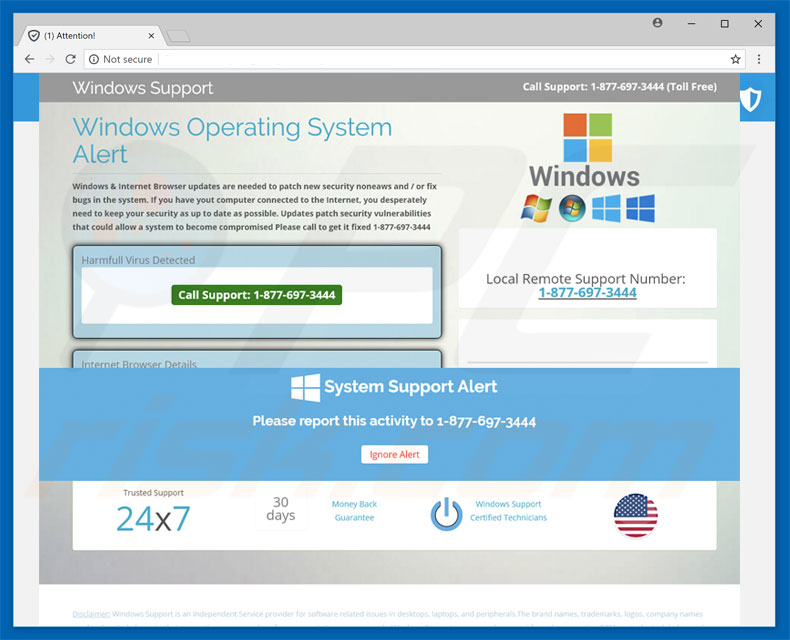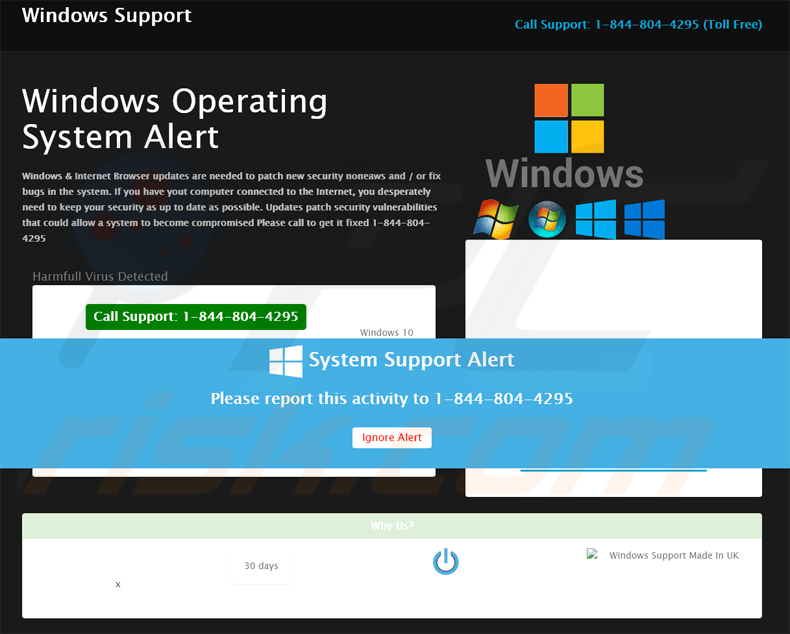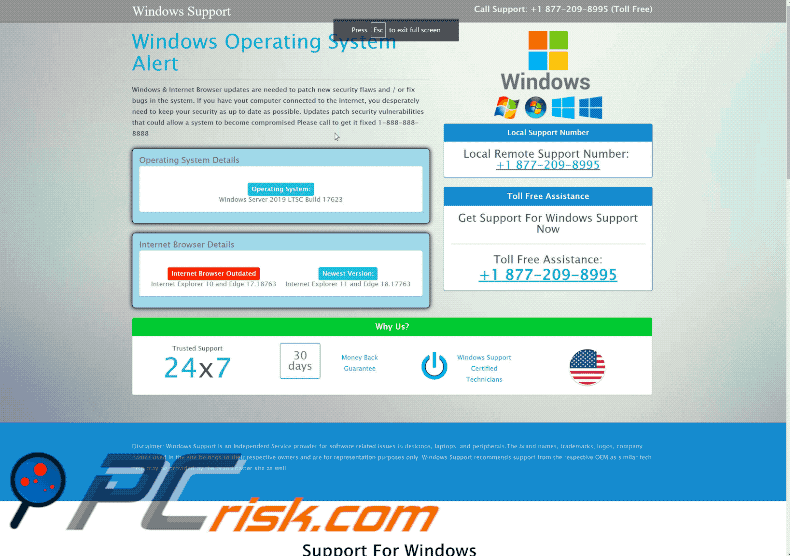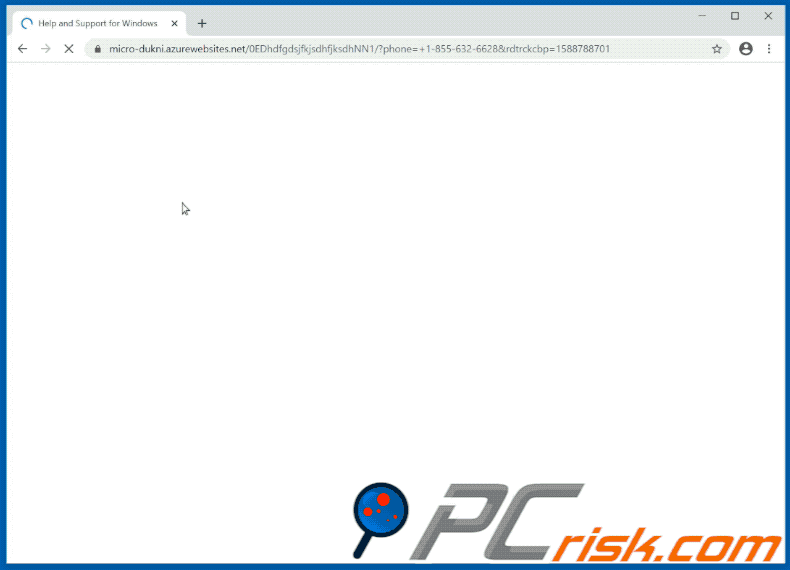Windows Operating System Alert POP-UP Scam
Phishing/ScamAlso Known As: "Windows Operating System Alert" virus
Get free scan and check if your device is infected.
Remove it nowTo use full-featured product, you have to purchase a license for Combo Cleaner. Seven days free trial available. Combo Cleaner is owned and operated by RCS LT, the parent company of PCRisk.com.
What is Windows Operating System Alert?
"Windows Operating System Alert" is a fake error message similar to Found 4 Virus, Error DT00X2, ERROR 268d3x8938, and many others. It is delivered by various dubious websites. In most cases, users visit these sites inadvertently - they are redirected by potentially unwanted applications (PUAs) or advertisements displayed on other rogue sites.
Be aware that many potentially unwanted applications infiltrate systems without permission and, as well as causing redirects, deliver intrusive advertisements and gather sensitive information.

This error message states that the operating system and browser are outdated and should be updated immediately. Users are encouraged to contact the 'tech support center', which will guide them through the updating process. This is a scam. Your system is likely to be safe and up-to-date.
Cyber criminals attempt to trick gullible users into calling and paying for tech support that is not required. Therefore, ignore the "Windows Operating System Alert" message.
This error can be removed simply by closing the web browser, however, some rogue sites employ scripts that prevent users from closing browsing tabs/windows. In these cases, terminate the browser using Task Manager or simply restart the system. Do not restore the previous session the next time you open the browser, otherwise you will revisit the deceptive sites.
Potentially unwanted applications deliver various advertisements, including pop-ups, banners, coupons, and many others. These are delivered using tools that enable placement of third party graphical content on any visited website. They are likely to conceal underlying content, significantly diminishing the web browsing experience.
In addition, some might redirect to infectious websites and run scripts that download and install other rogue apps or even high-risk malware. Therefore, clicking them is risky and can result in computer infections. Potentially unwanted applications are also notorious for information tracking.
These apps often record IP addresses, website URLs visited, pages viewed, search queries, and other similar information. Once recorded, this data is shared with third parties (potentially, cyber criminals) who generate revenue by misusing private information.
The presence of data-tracking apps can thus lead to serious privacy issues or even identity theft. You are strongly advised to eliminate all potentially unwanted applications immediately.
| Name | "Windows Operating System Alert" virus |
| Threat Type | Phishing, Scam, Social Engineering, Fraud |
| Symptoms | Unauthorized online purchases, changed online account passwords, identity theft, illegal access of one's computer. |
| Distribution methods | Deceptive emails, rogue online pop-up ads, search engine poisoning techniques, misspelled domains. |
| Damage | Loss of sensitive private information, monetary loss, identity theft. |
| Malware Removal (Windows) |
To eliminate possible malware infections, scan your computer with legitimate antivirus software. Our security researchers recommend using Combo Cleaner. Download Combo CleanerTo use full-featured product, you have to purchase a license for Combo Cleaner. 7 days free trial available. Combo Cleaner is owned and operated by RCS LT, the parent company of PCRisk.com. |
As mentioned, "Windows Operating System Alert" shares many similarities with a number of other fake errors. All claim that the system is damaged (e.g., infected, missing files, or similar), however, these claims are merely attempts to trick users into paying for unnecessary tech support or useless software (e.g., fake anti-virus tools).
Potentially unwanted applications are all very similar. Most offer "useful feature", but since all are designed only to generate revenue for the developers, they deliver no real value for regular users. Rather than enabling the functionality promised, these apps pose a threat to your privacy and Internet browsing safety.
How did potentially unwanted applications install on my computer?
In some cases, potentially unwanted applications have official download/promotion websites, however, due to the lack of knowledge and careless behavior of many users, most infiltrate systems without permission.
Potentially unwanted applications are distributed using the aforementioned intrusive advertisements and a deceptive marketing method called "bundling" - stealth installation of potentially unwanted applications together with regular software/apps.
Developers hide "bundled" apps within "Custom/Advanced" options (or other sections) of the download/installation processes - they do not adequately disclose this information. Furthermore, many users click advertisements, rush download/installation processes, and skip steps. In doing so, they expose their systems to risk of various infections and compromise their privacy.
How to avoid installation of potentially unwanted applications?
Lack of knowledge and careless behavior are the main reasons for computer infections. The key to safety is caution. Therefore, pay attention when browsing the Internet, and downloading/installing software. Carefully analyze each window of the download/installation dialogs and opt-out of all additionally-included programs.
We strongly recommend that you avoid using third party downloaders/installers, since developers monetize them by promoting ("bundling") PUAs. Software should be downloaded from official sources only, using direct download links.
In addition, remember that intrusive advertisements typically seem legitimate, as developers invest many resources into their design, however, they redirect to dubious websites (gambling, adult dating, pornography, and so on). If you experience these ads, eliminate all dubious applications and browser plug-ins.
If your computer is already infected with PUAs, we recommend running a scan with Combo Cleaner Antivirus for Windows to automatically eliminate them.
Text presented in "Windows Operating System Alert" pop-up:
Windows Support
Windows Operating System Alert
Windows & Internet Browser updates are needed to patch new security noneaws and/ or fix bugs in the system. If you have your computer connected to the Internet, you desperately need to keep your security as up to date as possible. Updates patch security vulnerabilities that could allow a system to become compromised. Please call to get it fixed 1-877-697-3444
System Support Alert
Please report this activity to 1-877-697-3444
Another variant of "Windows Operating System Alert" tech support scam pop-up (tech support scammer are using 1-844-804-4295 phone number):

The appearance of Windows Operating System Alert pop-up scam (GIF):

Another variant of "Windows Operating System Alert" pop-up scam:

Text presented within:
Windows Support
Call Support: +1-855-632-6628 (Toll Free)Windows Operating System Alert
Windows & Internet Browser updates are needed to patch new security flaws and / or fix bugs in the system. If you have yout computer connected to the Internet, you desperately need to keep your security as up to date as possible. Updates patch security vulnerabilities that could allow a system to become compromised Please call to get it fixed +1-855-632-6628
Operating System Details
Operating System:
Windows Server 2019 LTSC Build 17623Internet Browser Details
Internet Browser Outdated
Internet Explorer 10 and Edge 40.18362.1.0
Newest version:
Internet Explorer 11.0.11 and Edge 44.18362.1.0Windows
Local Support Number
Local Remote Support Number:Toll Free Assistance
Get Support For Windows Support Now
Toll Free Assistance
+1-855-632-6628
Instant automatic malware removal:
Manual threat removal might be a lengthy and complicated process that requires advanced IT skills. Combo Cleaner is a professional automatic malware removal tool that is recommended to get rid of malware. Download it by clicking the button below:
DOWNLOAD Combo CleanerBy downloading any software listed on this website you agree to our Privacy Policy and Terms of Use. To use full-featured product, you have to purchase a license for Combo Cleaner. 7 days free trial available. Combo Cleaner is owned and operated by RCS LT, the parent company of PCRisk.com.
Quick menu:
- What is "Windows Operating System Alert" virus?
- How to identify a pop-up scam?
- How do pop-up scams work?
- How to remove fake pop-ups?
- How to prevent fake pop-ups?
- What to do if you fell for a pop-up scam?
How to identify a pop-up scam?
Pop-up windows with various fake messages are a common type of lures cybercriminals use. They collect sensitive personal data, trick Internet users into calling fake tech support numbers, subscribe to useless online services, invest in shady cryptocurrency schemes, etc.
While in the majority of cases these pop-ups don't infect users' devices with malware, they can cause direct monetary loss or could result in identity theft.
Cybercriminals strive to create their rogue pop-up windows to look trustworthy, however, scams typically have the following characteristics:
- Spelling mistakes and non-professional images - Closely inspect the information displayed in a pop-up. Spelling mistakes and unprofessional images could be a sign of a scam.
- Sense of urgency - Countdown timer with a couple of minutes on it, asking you to enter your personal information or subscribe to some online service.
- Statements that you won something - If you haven't participated in a lottery, online competition, etc., and you see a pop-up window stating that you won.
- Computer or mobile device scan - A pop-up window that scans your device and informs of detected issues - is undoubtedly a scam; webpages cannot perform such actions.
- Exclusivity - Pop-up windows stating that only you are given secret access to a financial scheme that can quickly make you rich.
Example of a pop-up scam:

How do pop-up scams work?
Cybercriminals and deceptive marketers usually use various advertising networks, search engine poisoning techniques, and shady websites to generate traffic to their pop-ups. Users land on their online lures after clicking on fake download buttons, using a torrent website, or simply clicking on an Internet search engine result.
Based on users' location and device information, they are presented with a scam pop-up. Lures presented in such pop-ups range from get-rich-quick schemes to fake virus scans.
How to remove fake pop-ups?
In most cases, pop-up scams do not infect users' devices with malware. If you encountered a scam pop-up, simply closing it should be enough. In some cases scam, pop-ups may be hard to close; in such cases - close your Internet browser and restart it.
In extremely rare cases, you might need to reset your Internet browser. For this, use our instructions explaining how to reset Internet browser settings.
How to prevent fake pop-ups?
To prevent seeing pop-up scams, you should visit only reputable websites. Torrent, Crack, free online movie streaming, YouTube video download, and other websites of similar reputation commonly redirect Internet users to pop-up scams.
To minimize the risk of encountering pop-up scams, you should keep your Internet browsers up-to-date and use reputable anti-malware application. For this purpose, we recommend Combo Cleaner Antivirus for Windows.
What to do if you fell for a pop-up scam?
This depends on the type of scam that you fell for. Most commonly, pop-up scams try to trick users into sending money, giving away personal information, or giving access to one's device.
- If you sent money to scammers: You should contact your financial institution and explain that you were scammed. If informed promptly, there's a chance to get your money back.
- If you gave away your personal information: You should change your passwords and enable two-factor authentication in all online services that you use. Visit Federal Trade Commission to report identity theft and get personalized recovery steps.
- If you let scammers connect to your device: You should scan your computer with reputable anti-malware (we recommend Combo Cleaner Antivirus for Windows) - cyber criminals could have planted trojans, keyloggers, and other malware, don't use your computer until removing possible threats.
- Help other Internet users: report Internet scams to Federal Trade Commission.
Share:

Tomas Meskauskas
Expert security researcher, professional malware analyst
I am passionate about computer security and technology. I have an experience of over 10 years working in various companies related to computer technical issue solving and Internet security. I have been working as an author and editor for pcrisk.com since 2010. Follow me on Twitter and LinkedIn to stay informed about the latest online security threats.
PCrisk security portal is brought by a company RCS LT.
Joined forces of security researchers help educate computer users about the latest online security threats. More information about the company RCS LT.
Our malware removal guides are free. However, if you want to support us you can send us a donation.
DonatePCrisk security portal is brought by a company RCS LT.
Joined forces of security researchers help educate computer users about the latest online security threats. More information about the company RCS LT.
Our malware removal guides are free. However, if you want to support us you can send us a donation.
Donate
▼ Show Discussion